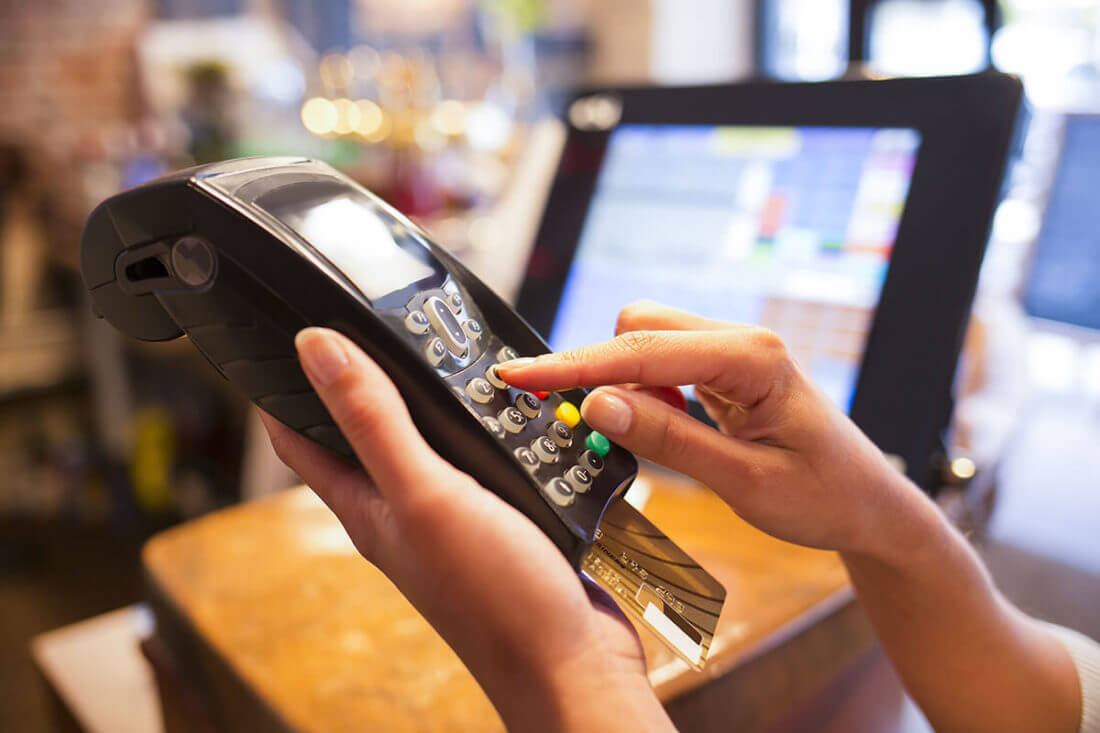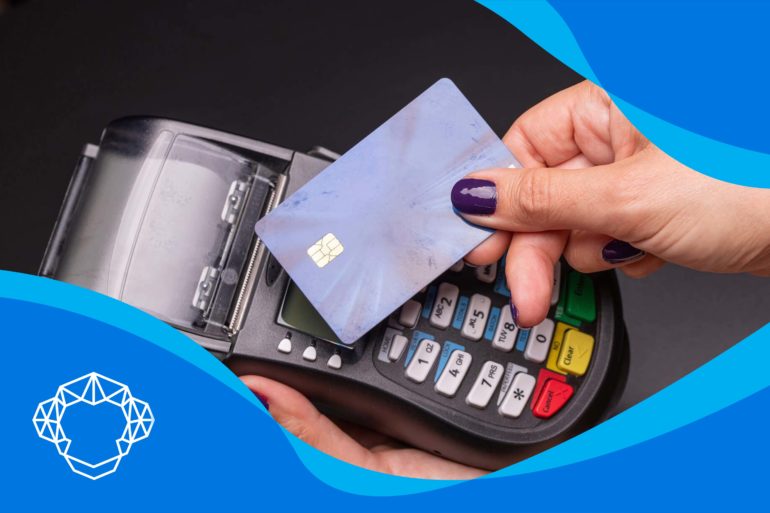If you want to swim in the vast ocean of eCommerce today, and have your brick-and-mortar store receive a steady influx of customers, you need to be able to process card payments. That’s why it’s due time to learn how to setup a merchant account for credit cards.
You can set up a merchant account (MA) through a merchant service (MS) company or bank. They can help you get started and define many things that might still be unclear to you, such as your company structure and type. MS often offers more benefits than traditional banks.
Before You Learn How to Set Up a Merchant Account for Credit Cards, Learn the Lingo
As a potential business owner, you’re likely familiar with the requirements for that, but if you aren’t, we can help. Before we discuss the steps of setting up a merchant account for credit cards, we’ll say more about what a merchant processing company is, how to choose an operating structure, and the requirements for setting up an MA.
After establishing the essentials of your company, you can learn more about payment gateways and things like convenience fees for cards. However, don’t go ahead of yourself. First, discover the best places to open a business and whether yours can attract enough customers to become successful.
Think about your idea and what it might represent in today’s market. Most industries and fields are highly competitive, but it might just work if you plan to offer benefits and convenience.
Key Statistics of Diverse Payment Options
According to projections, the worldwide merchant services industry will be worth $3.27 trillion in the year 2028, as more and more businesses treat plastic as the new gold. But here are some statistics that will further convince you of the necessity of different types of payment processing:
- Over 80% of buyers prefer using debit or credit cards instead of cash when shopping.
- Contactless payments have globally surged by 40% since the start of the COVID-19 pandemic.
- In the U.S., 63% of consumers have made purchases using digital wallets.
- 72% of consumers choose credit cards with rewards programs to maximize the benefits of their purchases.

What Are Merchant Accounts and Services?
A merchant account is a type of bank account that allows businesses to accept and process payments, usually made with credit or debit cards. When a customer makes a purchase using one of their cards, the funds are first deposited into the merchant account. After the transaction is processed and approved, the money is then transferred to the business’s regular bank account.
Merchant accounts are essential for businesses that want to offer various payment options, including in-person, online, and mobile payments, to provide customers with convenience and flexibility. In addition to handling payments, these types of accounts also provide additional features. This includes fraud protection, chargeback management, and customer service.
Applying for an MA with the bank you’re already cooperating with may be the best option, as some small businesses or start-ups aren’t always lucky enough to get an MA. Banks consider them as extensions of credits and assess companies over time, creating the possibility of not giving accounts for new businesses.
MS is offered by your bank or a specialized service provider. Sometimes, payment and credit card processing companies provide them, too.
When choosing an adequate provider, you must look at the following: they provide a suitable and affordable payment plan for your company, have reasonable pricing, and include ease of use and compatibility with your gear and software. Some companies, like Merchant Chimp, offer to process cards and MS, next to more benefits.
What Do I Need Before Setting Up an MA?
Preparation is always key, and you will need several key pieces of information and documents to ensure a smooth application process. Here’s what you’ll need to prepare:
- A business license for your specific industry and trade,
- Become PCI compliant,
- Set up a bank account,
- A set company structure and direction (static POS terminals, wireless card machines, ways of collecting information off of cards, will you have an online store, too,)
- Paperwork that details your company’s age, size, volume, and risk assessment,
- A completed online application,
- A solid credit card processing company with reasonable fees,
- Be prepared for any follow-up questions or checkups from the bankers.
How Does It Work?
To start accepting credit and debit card payments, you need to establish a contract with a reputable merchant account provider or acquiring bank. They will help you select the card networks your business will accept.
There are different types of merchant accounts, including mobile, traditional, and online accounts, but all involve a merchant account provider and a payment processor. When a customer pays using their card – either by swiping in person or entering details online – the payment data is first handled by your merchant account provider or acquiring bank. The card networks then process and authorize the transaction, ensuring funds are securely transferred to your merchant account.
The Parties Involved
Setting everything up involves working with several key entities to process credit card payments smoothly. Understanding the roles of each party involved can help ensure a seamless setup and operation.
| Party | Description |
|---|---|
| The merchant | The business owner who wants to accept credit card payments from customers. |
| Acquiring bank or merchant account provider | The bank where you open your merchant account, which receives consumer payments. |
| Payment processor | Manages and authorizes Visa, Mastercard, and American Express transactions. They secure cash transactions, ensuring firms get paid on time. |
Find A Reliable Card Processing Company for Payments
After getting a license, the first thing you’ll need to do is find a suitable and reliable company that does credit card processing services. Essentially, fees and costs will be the biggest issue. Even if a company offers good rates to process cards, their cancellation and monthly statement fees could be steep.
Some companies consider different or third-party payment processors to cover online and purchases by cards. These transactions can be covered separately by multiple providers that process payments, and it may save you some money along the way.
How come? Well, some companies may offer more benefits for specific types of transactions, businesses, or accounts. You can try another processor if you find one with affordable monthly gateway and statement fees, but its processing fees are off the charts.

Set Up an Adequate Business Structure for Your Company
While looking for the best card processors for small businesses, think if you wish to classify your company as such. Sure, you’re just starting, so you might automatically be a small business, but other options exist.
Some of the most successful small businesses we know of are classified as start-ups or home-based operations. The following questions and matters can define your company: will you have office space and employees? Will there be an online shopping system established? Can clients find you and shop online?
Many businesses operating today are a mix of online and brick-and-mortar operations, and they have processors for both establishments. Those processors may even be different, which likely saves them money monthly.
Besides Cards, Will You Have a Mobile Payment Option?
Different types of businesses are yet to include mobile payments into their operating system, but those that do, see a steady flow of customers. Having a mobile paying option when your clients shop online or in-store will mean more money and a broader customer base.
But, what are mobile payments? They’re both new and old tech that’s just now coming alive. Have you ever heard of Amazon Pay, Apple Pay, and Google Pay? These platforms support paying by mobile. Apple Pay is for Apple device users, and Google Pay is for Android device users. They function as virtual wallets and keep funds in one place.
When a person wants to shop with their Apple Pay wallet, all they have to do is log in and scan the wallet on your business’s POS machine. That’s it. More and more people use this method to pay, and having the option in your store will satisfy potential customers.
Can Your Customers Find Your Company and Shop Online?
Most people still use their cards to shop, both online and in-store. These people also check the internet for a company website before going there. If you don’t want to apply one of the e-commerce business models to your company and allow e-commerce trading, at least have a functional website with a descriptive ‘about us’ section.
However, establishing an e-commerce paying option will be an excellent idea if you plan to sell goods. People often order goods online, and you’ll rank highly if you have an online presence where they can safely and securely enter information off their cards.
Here’s a video that briefly describes the pros and cons of establishing an e-commerce firm.

Traditional Banks vs. MS Providers – Where to Open an MA?
Sometimes it’s better to go with the flow and choose the financial institutions that have supported us until now. More and more banks try to introduce support for small businesses, make exceptions for them, and offer an effortless application.
At the same time, MS providers are more well-rounded and willing to offer additional options for boosting and supporting your company. We mentioned PCI compliance, which MS providers can do for you, but they can also contact and find acquiring banks that can be suitable intermediaries.
Both sides have pros and cons, but it mostly depends on your company’s model, operations, and purpose. Overall, for start-ups and brand new businesses, MS providers may be a safer choice, but researching them will be essential to making the right decision.
Traditional Banks are Safer for New Businesses
Since MAs are particular financial accounts, new businesses can have more benefits if they just open an MA at their chosen banks. Both accounts are necessary if you want to accept any transactions from cards, and banks can offer processor activities along with that.
Besides that, your chosen establishment might have acquiring banks they work with and offer advantages for working with them. Acquiring banks act as intermediaries between businesses that accept card transactions and their issuing banks.
Some disadvantages of opening an MA with your chosen financial institution could be non-competitive rates, not following up on next-day payments, and their more common position of being the middlemen in transactions.
Service Providers Often Offer More Benefits than Banks
If you choose to open an MA with an MS provider, you’ll see more benefits than just having a financial setup. MS providers can process cards and transactions and make your company compliant with every financial rule in the game.
The same company can provide merchant services and credit card processing. They can act as go-betweens for banks, your company, and clients. This allows you to accept your clients’ preferred method of paying.
You can also buy or rent terminals for cards and mobile swipers from MS providers. They will smoothly integrate with your e-commerce store if you have an online company. You can accept transactions online or over the phone using virtual terminals. They will assist you in determining which payment processor services are best for your company.
Your MS providers can also ensure you are PCI compliant. This implies that any cardholder data you store, including names and cards’ numbers, is safe. Businesses may protect their data by adopting strong passwords and routinely upgrading their antivirus software.
They can tokenize transaction information and put fraud protection measures to protect your company. It might be better to contact your desired MS providers and ask about their MS rates.

What Could They Ask for When You Start Setting Up an MA?
You need an MA because statistics show that 62% of Americans pay for goods and services with cards. However, to get to that MA, you’ll have to fulfill specific criteria. Here’s what banks and providers might ask you to submit before giving you an MA:
- To set up a company bank account – one of the first stages in legitimizing your firm is separating personal and company costs. This demonstrates your commitment to the company and can lessen your liability and protect your assets if you face financial difficulties. Proof of a business record, as well as financial statements, is one of the MA requirements,
- To prepare and present financial statements – you’ll need financial statements to demonstrate your company’s strength, usually from the past two years (if you can go that far); statements that display how much money you regularly process; personal bank statements, so they know you’re trustworthy; and your company’s credit history which reveals if you’re financially dependable or a high-risk liability,
- To present your company license – it’s not mandatory for all businesses, but you may have to have one. A general license, sales tax registration, professional/occupational license, or worker’s compensation, for example, are all examples of this. Check with your MA source and local legislation to find out what the specific license requirements are,
- To have an Employer Identification Number (EIN) – this is what you use instead of your social security number when filing company taxes. Consider it the SSN for your company. It’s a one-of-a-kind identification used on banking, tax, and other legal documents,
- To prepare supporting documents – different MA providers have varied documentation requirements. You may be required to produce the following documents: operating plan and marketing materials, checks that have been voided, company policies like return, shipping, and others, forecasts, and inventory reports.

Contact Us For Reliable Merchant Services and Much More Than That
If you have any small business ideas and want to make them happen, you’ll require one of the best MS providers in the game. You can look no further than Merchant Chimp. We offer an all-encompassing company-establishing experience that’ll make you feel like you were always meant to be a business owner.
In us, you’ll find a suitable credit card processor, a POS-terminal supplier, and a financial consultant for every situation. Contact us today, inquire about our discount program, and start building your new company from the ground up.








